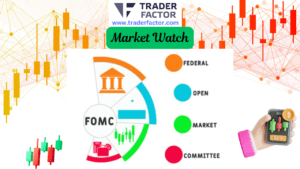Last week, global financial markets were weighed down by recession fears, which weighed on stock indexes, commodities, and risk-sensitive currencies. The 10-Year/2-Year yield spread, a so-called recession predictor, fell further into inversion. This indicates declining confidence in the Fed’s ability to orchestrate a “soft landing.”
US Markets
Key Points:
- The Dow Jones gained 2.15 percent on Friday, nearly erasing its weekly loss.
- Despite some US dollar weakness, gold prices fell into the weekend.
- Brent and WTI crude oil prices have fallen more than 5% as growth fears have increased. The EIA reported a large increase in gasoline inventory, which lowered demand expectations.
- The Canadian Dollar, which is linked to oil, fell. This week, Canada’s June inflation rate fell.
The US Dollar Index (DXY) has reached its highest point since September 2002.
Expectations for economic growth have recently decreased significantly. The most recent indication that there are growing global growth hurdles was China’s Q2 GDP statistics.
For the month of June, the US consumer price index (CPI) posted its highest reading in more than 40 years.
The market has already factored in the possibility of a full percentage point raise by the Fed later this month.
After multiple Fed officials downplayed expectations, those wagers were drastically reduced as the weekend approached.
According to a University of Michigan study, US consumers’ long-term inflation forecasts decreased in the first few days of July.
In addition to a solid US retail sales report, this helped equities close the week strongly.
Europe Markets
Key Points
- After rising 1.8 percent on Friday, the pan-European Stoxx 600 rose 1.45 percent to 419.79.
- The German DAX, France’s CAC 40, and the United Kingdom’s FTSE 100 rose between 1.3 and 1.4 percent.
- Euromoney Institutional Investor rose 9.4 percent after agreeing to be acquired for £1.6 billion by a private equity consortium led by France’s Astorg Asset Management.
- GSK fell 19% after the drug maker spun off its consumer health business in Europe’s largest listing in more than a decade.
- Nordea Bank of Finland rose 3.5 percent after its second-quarter profit exceeded expectations.
- Despite lowering its annual sales forecast, food delivery company Deliveroo increased by 1.5 percent.
European stocks moved up on Monday before this week’s ECB meeting and the anticipated restart of a crucial gas pipeline that is currently halted for maintenance.
The Euro was another big loser against the USD, briefly breaking parity.
The European Central Bank (ECB) is expected to begin its rate-hike cycle on Thursday with a 25 basis-point increase.
Energy prices are expected to increase later this year, and Europe’s inflation rate is significantly higher than the ECB’s target.
Even though many think the ECB is already far behind the curve in combating inflation, markets are already pricing in a 50 basis point rate increase for its September meeting.
There is still uncertainty about whether Russia will continue to disrupt gas supplies to Europe via the Nord Stream 1 pipeline.
The pipeline’s annual maintenance is currently scheduled to end on July 21st. If Russia prolongs the disruption of gas supplies, European equities and the Euro will face significant pressure.
On the technical front, downside momentum is likely to continue, and the YTD low has held for the time being. The risk remains low, with a break through the YTD low allowing access to 12000.
Japanese Yen
The Japanese Yen fell nearly 2% against the US Dollar in 2022, keeping it the worst performing major currency.
The Bank of Japan is expected to maintain its ultra-easy policy when it meets on Thursday, though inflation and growth forecasts may change.
Policymakers have expressed concern about JPY weakness, and some believe the 140 level will trigger an intervention, but this is unlikely to happen before the BoJ meeting. Japan’s June inflation rate is also expected to spike.
S&P 500 | Bear Market Bounce To Close The Week
Despite the erratic currency exchange rates, which saw the USD hit new highs and the US inflation rate jump to an alarming 9.1%, markets began to move in favor of a 100bps boost.
The weekly losses in the equity markets have been cut in half as they end the week on a brighter note. The manner in which stocks are handling this is extremely noteworthy.
However, as previously indicated, the bias is still to downplay negative market rallies. Additionally, based on the S&P 500’s overall monthly performance this year, equities may continue to suffer the following week.
Numerous other factors, including the ECB’s decision and whether Russia resumes gas deliveries through Nord Stream 1, pose significant risks to the markets.
DAX 40 | Russia Gas Flows, ECB, Anti-Fragmentation Tool
Next week, the focus will be on European risk events. First, the first rate increase since 2011 is anticipated by the ECB.
However, because the ECB has already committed to raising rates by 25 basis points, their anti-fragmentation tool will be the main focus.
It has been difficult to predict if the ECB will offer enough information on the size and deployment of the new instrument, given reports that negotiations about it are ongoing. Failure to do so, however, runs the risk of falling short of market expectations, depressing risk sentiment, and driving down the value of the Euro.
FUNDAMENTAL WEEKLY FORECASTS:
Euro (EUR/USD) – It’s Time for the ECB to Grab the Nettle
The Euro is facing a week of high-risk events, and on Thursday, the single currency will look to the ECB for stability and guidance.
More EUR/USD volatility is likely.
Canadian Dollar: The Canadian Dollar at the Behest of Crude Oil and the Roaring US Dollar
The Canadian dollar is in for a big week, with Canadian inflation, a hawkish Fed, and low crude oil prices driving USD/CAD price action.
Sterling (GBP) PM: Race Heats Up in Time for Heatwave
UK inflation and jobs data will be released next week, following the weekend’s televised PM debates.
Bitcoin (BTC/USD) Resilience Maintains Following Another Big Week For USD
Despite the shocking US CPI print, Bitcoin, Ethereum, and their alt coin counterparts have recovered. Despite fundamental risks, BTC/USD remains above $20,000.
AUD/USD rate has recovered. RBA Policy Susceptible to Preset Path
The Reserve Bank of Australia (RBA) Minutes may have little impact on the AUD/USD because the central bank appears to be on a predetermined path toward normalizing monetary policy.
Weekly Stock Market Forecast:
S&P 500 & DAX 40
Russian Gas Flows, the ECB’s Anti-Fragmentation Tool, and Italian Politics are all in the spotlight.
Japanese Yen Forecast:
Will a Dovish BoJ Keep USD/JPY Rising?
The Japanese Yen is vulnerable to external forces, despite the Bank of Japan remaining one of the few dovish central banks. Is it safe to expect the USD/JPY to continue rising?
TECHNICAL WEEK FORECASTS:
S&P 500, Nasdaq, and Dow Jones
The stock market is maintaining its range from July, although it may be ready to continue its rebound inside the yearlong downturn. Levels on the S&P 500, Nasdaq, and Dow technical charts are important.
Gold Turn or Burn as Bears Drive to 1700
During a five-week stretch of declines, gold prices had dropped by 10%. Is there any hope for XAU bulls given the looming two-year lows below?
Disclaimer:
All information has been prepared by TraderFactor or partners. The information does not contain a record of TraderFactor or partner’s prices or an offer of or solicitation for a transaction in any financial instrument. No representation or warranty is given as to the accuracy or completeness of this information. Any material provided does not have regard to the specific investment objective and financial situation of any person who may read it. Past performance is not a reliable indicator of future performance.


















